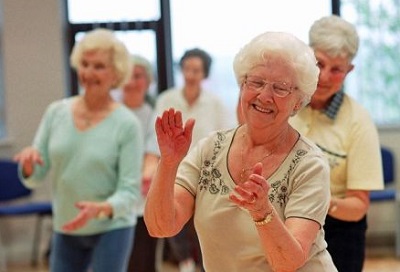“SOCIAL prescribing is fundamental to the future of the NHS” said a doctor interviewed on BBC Radio 4’s “Today” programme this week.
He was talking about a profound shift in thinking towards the idea that as well as prescribing conventional medicines and treatments, GPs should be able to prescribe a wide range of activities to promote and support physical and mental wellbeing. Examples, depending on the patient’s needs, could include walking groups, exercise classes, shared interest social groups, arts activities and so on.
 The change comes amid growing evidence that referrals to community services such as exercise or art classes, history groups and even ballroom dancing can boost health and wellbeing more than dishing out pills or other treatments. Around half of GP appointments are not directly related to medical conditions, according to experts.
The change comes amid growing evidence that referrals to community services such as exercise or art classes, history groups and even ballroom dancing can boost health and wellbeing more than dishing out pills or other treatments. Around half of GP appointments are not directly related to medical conditions, according to experts.
Now the NHS is recruiting an army of advisers to ramp up social prescribing to help patients live fitter, healthier lives and combat anxiety, loneliness and depression. It plans to recruit 1,000 social prescribing “link workers” over the next two years, with more to follow later. They will give people time to talk about what matters to them and support them to find suitable activities that are a better alternative to medication as part of a step change in the provision of ‘personalised care’.
Every GP surgery in England will be part of a Primary Care Network with access to its own social prescriber link worker, fully funded by the NHS. It is envisaged that by 2023-24, social prescribers will be handling around 900,000 patient appointments a year.
Dr Richard Vautrey, from the British Medical Association, said: “Every day, GPs see a large number of patients with a broad range of health conditions. But often, those who come to see their GP will have complex underlying reasons for doing so, not always medical and often linked to social and domestic circumstances which affect their physical and mental wellbeing.
“Good access to professionals who can link patients to local services and activities – such as community support groups and classes – can be of great benefit to patients, actively involving them in their own care and improving their longer-term wellbeing. The BMA has long backed social prescribers supporting the General Practice team and this commitment to roll them out across the country is very welcome.”
Professor Helen Stokes-Lampard, chairwoman of the Royal College of General Practitioners, added: “Often the underlying reason a patient visits their GP is not medical, yet it can have a considerable impact on their health and wellbeing. Ensuring that GPs and our teams have good, easy access to people who can link patients with classes or groups in the community and other non-NHS services, that could potentially be of far more benefit than any medicine, is something the College has long called-for, so the focus on this is incredibly welcome.”
Social prescribing recognises that a patient’s personal, social and financial circumstances can also impact their health, so it connects them to care and support options in their communities alongside appropriate NHS care. Social prescribers will work with a wide range of people including those:
- with one or more long-term condition
- who need support to help with alcohol and smoking issues
- who need support with their mental health
- who are lonely or isolated
- who have complex social needs which affect their wellbeing.
Dr Marie-Anne Essam, a GP in Hertfordshire, commented: “In the 30 years I have spent as a GP, social prescribing represents the most effective, wide reaching and life-changing of all initiatives to date. Sometimes I have no idea what underlies a person’s repeated presentation to the surgery.
“Sometimes I catch a glimpse of one or two social determinants of health – like seeing the tip of an iceberg. The link worker spends time and expertise which I lack, to explore with the patients the rest of the iceberg, bit by bit. People are enabled to use the clinical services more productively, and make personal advances which are both transformative and sustainable.”
